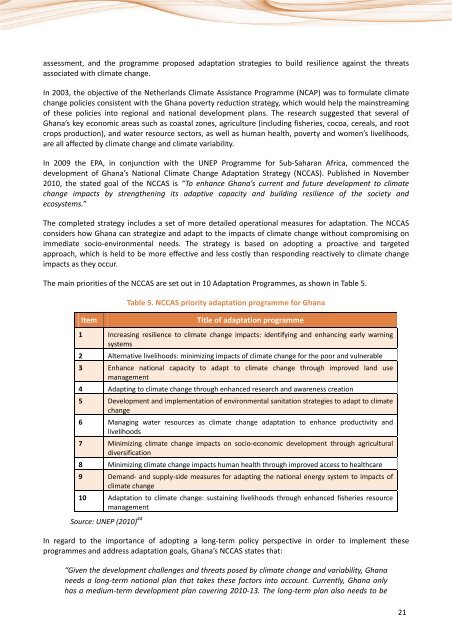Information and communication technologies (ICTs) and ... - ITU
Information and communication technologies (ICTs) and ... - ITU
Information and communication technologies (ICTs) and ... - ITU
You also want an ePaper? Increase the reach of your titles
YUMPU automatically turns print PDFs into web optimized ePapers that Google loves.
assessment, <strong>and</strong> the programme proposed adaptation strategies to build resilience against the threats<br />
associated with climate change.<br />
In 2003, the objective of the Netherl<strong>and</strong>s Climate Assistance Programme (NCAP) was to formulate climate<br />
change policies consistent with the Ghana poverty reduction strategy, which would help the mainstreaming<br />
of these policies into regional <strong>and</strong> national development plans. The research suggested that several of<br />
Ghana’s key economic areas such as coastal zones, agriculture (including fisheries, cocoa, cereals, <strong>and</strong> root<br />
crops production), <strong>and</strong> water resource sectors, as well as human health, poverty <strong>and</strong> women’s livelihoods,<br />
are all affected by climate change <strong>and</strong> climate variability.<br />
In 2009 the EPA, in conjunction with the UNEP Programme for Sub-Saharan Africa, commenced the<br />
development of Ghana’s National Climate Change Adaptation Strategy (NCCAS). Published in November<br />
2010, the stated goal of the NCCAS is “To enhance Ghana’s current <strong>and</strong> future development to climate<br />
change impacts by strengthening its adaptive capacity <strong>and</strong> building resilience of the society <strong>and</strong><br />
ecosystems.”<br />
The completed strategy includes a set of more detailed operational measures for adaptation. The NCCAS<br />
considers how Ghana can strategize <strong>and</strong> adapt to the impacts of climate change without compromising on<br />
immediate socio-environmental needs. The strategy is based on adopting a proactive <strong>and</strong> targeted<br />
approach, which is held to be more effective <strong>and</strong> less costly than responding reactively to climate change<br />
impacts as they occur.<br />
The main priorities of the NCCAS are set out in 10 Adaptation Programmes, as shown in Table 5.<br />
Table 5. NCCAS priority adaptation programme for Ghana<br />
Item<br />
Title of adaptation programme<br />
1 Increasing resilience to climate change impacts: identifying <strong>and</strong> enhancing early warning<br />
systems<br />
2 Alternative livelihoods: minimizing impacts of climate change for the poor <strong>and</strong> vulnerable<br />
3 Enhance national capacity to adapt to climate change through improved l<strong>and</strong> use<br />
management<br />
4 Adapting to climate change through enhanced research <strong>and</strong> awareness creation<br />
5 Development <strong>and</strong> implementation of environmental sanitation strategies to adapt to climate<br />
change<br />
6 Managing water resources as climate change adaptation to enhance productivity <strong>and</strong><br />
livelihoods<br />
7 Minimizing climate change impacts on socio-economic development through agricultural<br />
diversification<br />
8 Minimizing climate change impacts human health through improved access to healthcare<br />
9 Dem<strong>and</strong>- <strong>and</strong> supply-side measures for adapting the national energy system to impacts of<br />
climate change<br />
10 Adaptation to climate change: sustaining livelihoods through enhanced fisheries resource<br />
management<br />
Source: UNEP (2010) 44<br />
In regard to the importance of adopting a long-term policy perspective in order to implement these<br />
programmes <strong>and</strong> address adaptation goals, Ghana’s NCCAS states that:<br />
“Given the development challenges <strong>and</strong> threats posed by climate change <strong>and</strong> variability, Ghana<br />
needs a long-term national plan that takes these factors into account. Currently, Ghana only<br />
has a medium-term development plan covering 2010-13. The long-term plan also needs to be<br />
21

















